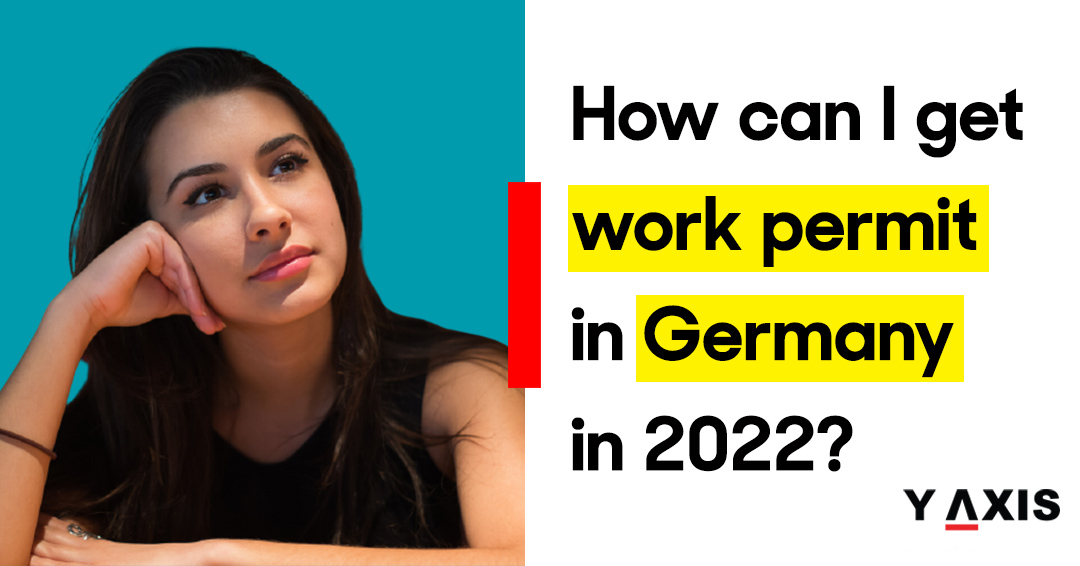Posted on April 21 2022
How can I get work permit in Germany in 2022?
By , Editor
Updated September 27 2024

Germany is an attractive country for migrants who are on the lookout for overseas jobs. UAE candidates and other non-EU nationals who meet the eligibility criteria and are highly skilled are in demand in Germany. Though there is a shortage of professionals in several fields, candidates from all over the world belonging to science, technology, mathematics and engineering (STEM) and healthcare, and research, among others, are most sought-after.
If you want to work in Germany, you need to get a work permit.
*Check your eligibility to Germany with the help of Y-Axis Germany Immigration Points calculator.
Differences between a work permit and a work visa
While a visa is a document needed by foreign nationals wanting to enter a country, a work permit is a letter of employment issued by an organization to an employee to enter a new nation to undertake employment.
While immigration authorities issue visas, these authorities have the right to either permit or reject a person from entering that country.
Work permits allow organizations, be they national or multinational, to hire workers from foreign lands. Unlike EU nationals, individuals from outside of that continent need a visa to enter and work in Germany with a work permit.
Aspiring migrant workers must make sure that they understand the eligibility criteria of the available options before deciding which German visa they must apply for. They should also ensure that they do not work on a short stay visa in Germany.
German's common work permits
While in Germany, you can work on either of the following popular permits – Temporary residence permit
Most foreign employees in Germany opt for a temporary residence permit to work and reside there. It is also known as a limited residence permit which allows foreign nationals in Germany to stay in that country for a maximum of one year. Individuals meeting all the eligibility criteria can extend this permit as long as they meet the requirements.
After they successfully complete one year and if their employers are happy with their stint, they can apply for long-term visas.
Holders of the temporary residence permit can only work in Germany and not pursue studies simultaneously.
EU Blue Card
The EU Blue Cardis granted to talented professionals and is valid for a longer stay, unlike the temporary residence permit. It is eligible for bachelor's or master's degree holders who apply for positions relevant to their study field. They also should be earning a minimum gross salary of €56,400 annually. EU Blue Cards are mostly granted to those who may have graduated from a university in Germany or are highly qualified in STEM or healthcare fields.
Work permit requirements
Before entering Germany on a work permit, they need to have a job offer in hand from a German-based employer.
Required documents
German work permit holders must carry a job offer letter from a German-based company, passport, annexure for the employment permit, educational qualifications certificates, letters of work experience, and the German Federal Employment Agency’s letter of approval.
Individuals wanting to take their family members along with them to Germany should be aware of the following:
- Their own or adopted children must be aged below 18
- They must earn enough in Germany to take care of their family and themselves.
- They must make arrangements for the accommodation of their family members.
Although English is widely spoken in Germany, it will help if the migrants have basic proficiency in the German language.
After you complete one year in Germany without any hassles, you will be eligible to submit an application for a residence permit to let you work and reside in the world's fourth-largest economy.
If you are currently a UAE resident and plan to migrate to Germany, contact Y-Axis, the World's No. 1 Immigration Consultant.
If you liked what you read, please check the following as well....
Want to work in Germany in 2022? Start with the German job seeker visa
Tags:
Work permit in Germany
Share
Y-Axis Services
Get it on your mobile
Get News alerts
Contact Y-Axis
